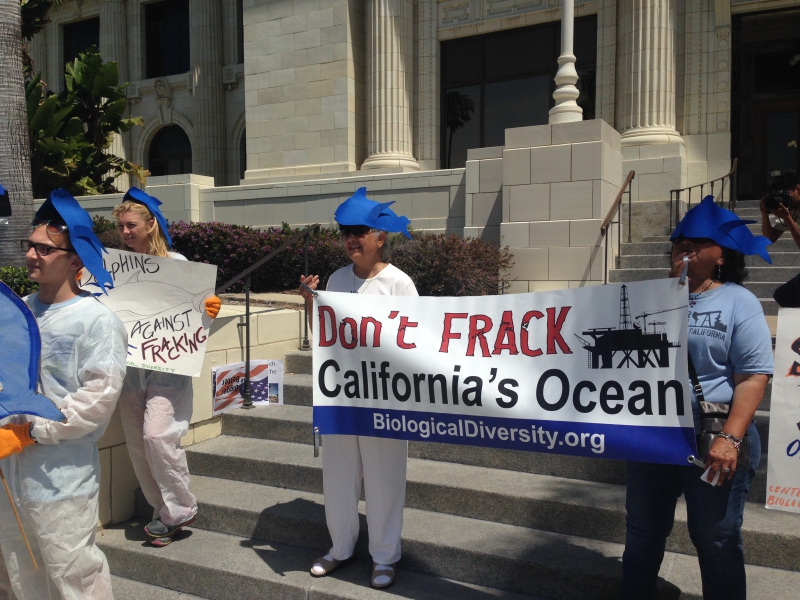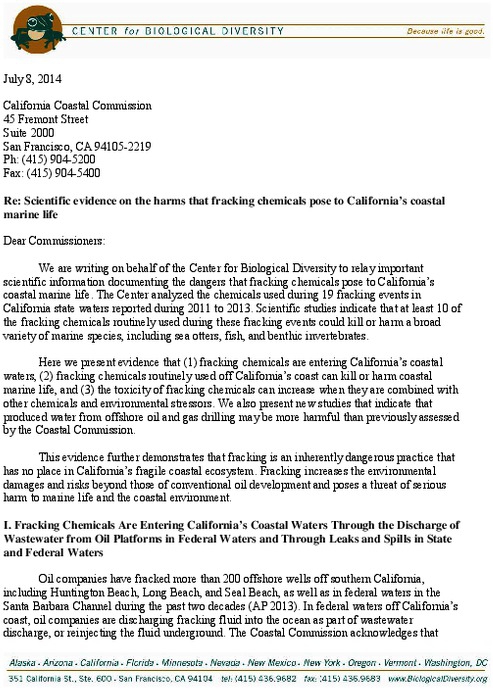From the Open-Publishing Calendar
From the Open-Publishing Newswire
Indybay Feature
Activists in hazmat suits protest offshore fracking
"We now know that fracking chemicals pumped into California’s offshore oil wells pose a scientifically documented danger to marine life,” said Center biologist Shaye Wolf, who wrote the letter to the Commission. “The Coastal Commission needs to protect our waters by halting fracking off California’s coast.”
Photo of offshore fracking protest in Ventura on July by Hilary Aidun, Center for Biological Diversity.
Photo of offshore fracking protest in Ventura on July by Hilary Aidun, Center for Biological Diversity.
Activists in hazmat suits protest offshore fracking
by Dan Bacher
As the California Coastal Commission met in Ventura on Wednesday, July 9, a dozen hazmat-suit-wearing protesters with the Center for Biological Diversity and Food and Water Watch urged the commissioners to consider a biologist’s warning that chemicals used in offshore fracking pose a toxic threat to sea mammals and coastal fish populations.
"We had really good turn out at the rally and it shows that a lot of people, especially those along the coast, are concerned about offshore fracking and its impacts," said Hillary Aidun of the Center for Biological Diversity.
The protest took place at 11 a.m. outside Ventura City Hall in Ventura. The Coastal Commission will also provide an update on the issue of offshore fracking during the second day of the meeting today.
“We now know that fracking chemicals pumped into California’s offshore oil wells pose a scientifically documented danger to marine life,” said Center biologist Shaye Wolf, who wrote the letter to the Commission. “The Coastal Commission needs to protect our waters by halting fracking off California’s coast.”
Oil companies have fracked at least 203 wells in waters off Huntington Beach, Long Beach and Seal Beach, as well as in federal waters in the Santa Barbara Channel, over the past 20 years, according to an Associated Press and Freedom of Information Act (FOIA) investigation last year. (http://www.usatoday.com/story/money/business/2013/10/19/calif-finds-more-instances-of-offshore-fracking/3045721/)
The Center analyzed the chemicals used during 19 fracking events at 19 different wells in California state waters reported during 2011 to 2013 on FracFocus. All 19 fracking events occurred in Long Beach Harbor within two miles from shore, Wolf wrote in her letter.
The letter explains that oil companies fracking in California waters have admitted to using at least 10 chemicals that can harm aquatic life. Nonylphenol ethoxylate, for example, is extremely toxic and has a long-lasting effect on aquatic environments, according to scientific research.
This chemical, which has been employed in at least 16 frack jobs in California state waters, can also bioaccumulate, that is, become dangerously concentrated in the bodies of creatures higher in the food chain, including sea otters.
“We found scientific studies indicating that at least 10 fracking fluid chemicals used offshore in California could kill or harm a broad variety of marine organisms, including sea otters, fish, and invertebrates, if released into the environment. Six of these 10 chemicals were used in all 19 frack jobs,” the letter stated.
Fracking involves blasting massive amounts of water and industrial chemicals into the earth at pressures high enough to crack geologic formations and release oil and gas. Scientific studies have revealed that fracking poses consider harm not only to fish and other aquatic life, but to human health as well.
Fracking operations can also spur earthquakes. A substantial number of earthquakes in one region of Oklahoma over the past several years can be linked to the process of fracking, according to a new study from Science magazine.
“About half the oil platforms in the Santa Barbara Channel discharge wastewater into the sea,” according to the Center. “The oil industry has federal permission to dump more than 9 billion gallons of wastewater, including fracking fluid, directly into the ocean off California’s coast every year. Fracking chemicals can cause cancer and pose an ecological hazard in these wildlife-rich waters.”
For more about offshore fracking, please go to http://www.StopOceanFracking.org.
Ironically, the same oil industry lobbyist who is leading the charge to expand fracking in California also served as chair of the state panel that created a series of so-called "marine protected areas" in Southern California. In an extreme conflict of interest, Catherine Reheis-Boyd, President of the Western States Petroleum Association (WSPA), chaired the Marine Life Protection Act (MLPA) Initiative Blue Ribbon Task Force for the South Coast. (http://www.dfg.ca.gov/marine/mpa/brtf_bios_sc.asp)
The Western States Petroleum Association President also “served” on the task forces to craft alleged “marine protected areas” on the Central Coast, North Central Coast and North Coast from 2004 to 2012. Much of the fracking exposed in the AP investigation occurred during the time the Reheis-Boyd served on these panels.
The so-called –marine protected created under the Initiative, privately funded by the Resources Legacy Foundation, fail to protect the ocean from fracking, oil drilling, pollution, corporate aquaculture and all human impacts on the ocean other than fishing and gathering.
by Dan Bacher
As the California Coastal Commission met in Ventura on Wednesday, July 9, a dozen hazmat-suit-wearing protesters with the Center for Biological Diversity and Food and Water Watch urged the commissioners to consider a biologist’s warning that chemicals used in offshore fracking pose a toxic threat to sea mammals and coastal fish populations.
"We had really good turn out at the rally and it shows that a lot of people, especially those along the coast, are concerned about offshore fracking and its impacts," said Hillary Aidun of the Center for Biological Diversity.
The protest took place at 11 a.m. outside Ventura City Hall in Ventura. The Coastal Commission will also provide an update on the issue of offshore fracking during the second day of the meeting today.
“We now know that fracking chemicals pumped into California’s offshore oil wells pose a scientifically documented danger to marine life,” said Center biologist Shaye Wolf, who wrote the letter to the Commission. “The Coastal Commission needs to protect our waters by halting fracking off California’s coast.”
Oil companies have fracked at least 203 wells in waters off Huntington Beach, Long Beach and Seal Beach, as well as in federal waters in the Santa Barbara Channel, over the past 20 years, according to an Associated Press and Freedom of Information Act (FOIA) investigation last year. (http://www.usatoday.com/story/money/business/2013/10/19/calif-finds-more-instances-of-offshore-fracking/3045721/)
The Center analyzed the chemicals used during 19 fracking events at 19 different wells in California state waters reported during 2011 to 2013 on FracFocus. All 19 fracking events occurred in Long Beach Harbor within two miles from shore, Wolf wrote in her letter.
The letter explains that oil companies fracking in California waters have admitted to using at least 10 chemicals that can harm aquatic life. Nonylphenol ethoxylate, for example, is extremely toxic and has a long-lasting effect on aquatic environments, according to scientific research.
This chemical, which has been employed in at least 16 frack jobs in California state waters, can also bioaccumulate, that is, become dangerously concentrated in the bodies of creatures higher in the food chain, including sea otters.
“We found scientific studies indicating that at least 10 fracking fluid chemicals used offshore in California could kill or harm a broad variety of marine organisms, including sea otters, fish, and invertebrates, if released into the environment. Six of these 10 chemicals were used in all 19 frack jobs,” the letter stated.
Fracking involves blasting massive amounts of water and industrial chemicals into the earth at pressures high enough to crack geologic formations and release oil and gas. Scientific studies have revealed that fracking poses consider harm not only to fish and other aquatic life, but to human health as well.
Fracking operations can also spur earthquakes. A substantial number of earthquakes in one region of Oklahoma over the past several years can be linked to the process of fracking, according to a new study from Science magazine.
“About half the oil platforms in the Santa Barbara Channel discharge wastewater into the sea,” according to the Center. “The oil industry has federal permission to dump more than 9 billion gallons of wastewater, including fracking fluid, directly into the ocean off California’s coast every year. Fracking chemicals can cause cancer and pose an ecological hazard in these wildlife-rich waters.”
For more about offshore fracking, please go to http://www.StopOceanFracking.org.
Ironically, the same oil industry lobbyist who is leading the charge to expand fracking in California also served as chair of the state panel that created a series of so-called "marine protected areas" in Southern California. In an extreme conflict of interest, Catherine Reheis-Boyd, President of the Western States Petroleum Association (WSPA), chaired the Marine Life Protection Act (MLPA) Initiative Blue Ribbon Task Force for the South Coast. (http://www.dfg.ca.gov/marine/mpa/brtf_bios_sc.asp)
The Western States Petroleum Association President also “served” on the task forces to craft alleged “marine protected areas” on the Central Coast, North Central Coast and North Coast from 2004 to 2012. Much of the fracking exposed in the AP investigation occurred during the time the Reheis-Boyd served on these panels.
The so-called –marine protected created under the Initiative, privately funded by the Resources Legacy Foundation, fail to protect the ocean from fracking, oil drilling, pollution, corporate aquaculture and all human impacts on the ocean other than fishing and gathering.
We are 100% volunteer and depend on your participation to sustain our efforts!
Get Involved
If you'd like to help with maintaining or developing the website, contact us.
Publish
Publish your stories and upcoming events on Indybay.
Topics
More
Search Indybay's Archives
Advanced Search
►
▼
IMC Network




